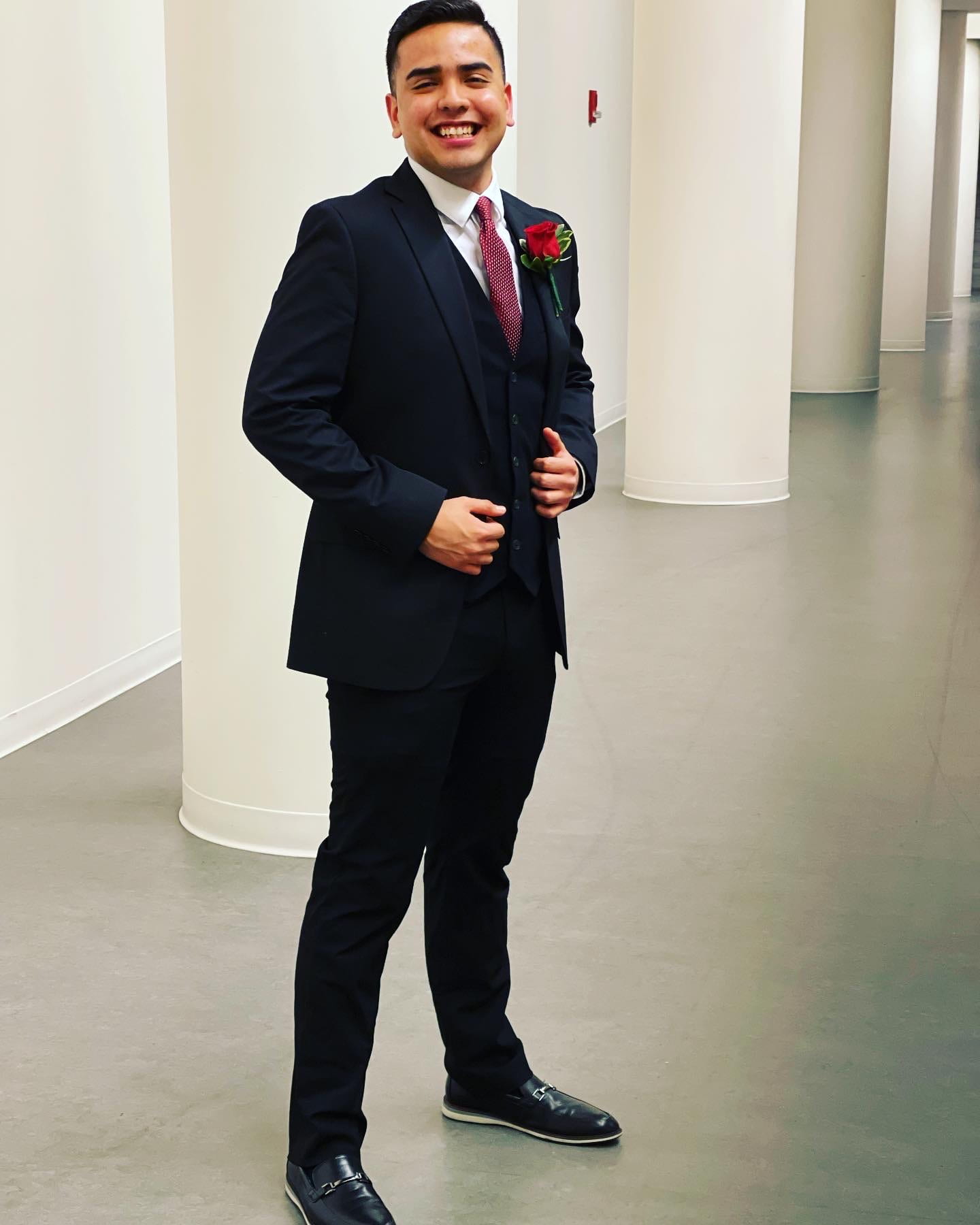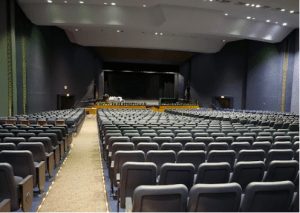
About the Author
Gilberto Lopez-Jimenez is a sophomore at Harvard College intending to concentrate in the field of Economics while obtaining a secondary in Ethnicity, Migration, and Rights, and a certificate in Latin American Studies. He is from the El Paso-Juárez Borderplex.
Acerca del Autor
Gilberto López-Jiménez es un estudiante matriculado en la Universidad de Harvard. Su intención es obtener una licenciatura en el campo de la Economía mientras obtiene una especialidad secundaria en Etnicidad, Migración y Derechos, y un certificado en Estudios Latinoamericanos. Es originario de la frontera de El Paso-Juárez.
Here, There, and Everywhere
Home and Identity as a First-Generation Mexican-American College Student
I landed at the El Paso International airport after a long-awaited return home. From the moment I got off the plane, the scent of wet rain, or petrichor, wafted from the breeze, a smell that had not stimulated my olfactory senses during my whole stay in the Boston area for my first year of college. I also smelled burritos, whose name is believed to derive from Ciudad Juárez, Mexico, a city adjacent to my hometown, El Paso, Texas. But something was different upon arriving home than when I had returned for the fall and winter breaks. Simply put, things were still the same, but everything had changed.
I was back home just in time for graduation season, a time of celebration and new beginnings. This year, my younger brother was graduating from high school. This was a heartfelt accomplishment for my family, as our generation is the first one in my family to do so.
My family sat in the Magoffin Auditorium at the University of Texas at El Paso, facing the caps and gowns of all colors from high schools all over El Paso. It was a graduation ceremony for the seniors who were part of the UTEP Upward Bound Program, a program originating from the Economic Opportunity Act of 1964, seeking to guide students and provide them with resources to prepare for college; I had also participated in the program before going to Harvard. The “Pomp and Circumstance” song was played, and the master of ceremonies began their speech. But they started their speech in Spanish, and this took me by surprise. It should not have surprised me since I grew up my whole life speaking English and Spanish, and a mix of both, often within the same sentence. In retrospect, I was probably not used to this type of situation anymore because I had not been home for about a year now, and the special culture in my border setting is something words cannot describe and one can only experience to understand.

Magoffin Auditorium at the University of Texas at El Paso
Take, for instance, that morning of the graduation ceremony; my aunt had crossed from Juárez to El Paso to see my brother’s big accomplishment. I have family on both sides of the border, and some of my cousins even live in Mexico and are enrolled in school here, so they cross the international bridge bright and early every day. My immediate family would also go to Juárez every weekend until we didn’t.
It was then that the deeply-engraved recuerdos (memories) came back. We crossed the Zaragoza International Bridge in our white sedan, just like any typical weekend. But this time, in many ways, it was a permanent change from which there was minimal looking back. The detailed recall is a bit blurry, but upon crossing the bridge, my dad drove us to an apartment complex, and we settled in one of the apartments. All we had was a TV and our clothes. We ate hamburgers from a fast-food restaurant and slept on the living room carpet that night. My parents left everything behind and brought almost nothing with them, though we were gifted things and slowly bought all necessities and home furnishings.

Cordova International Bridge between El Paso, Texas and Ciudad Juárez, Mexico
I was too little to fully understand the magnitude of their sacrifice. Not long after, I started to put the puzzle pieces together. I would watch the local news and pay particular attention anytime they talked about immigration reform, simply because my parents were especially attentive when that subject matter was discussed. I also noticed that my parents would work extremely hard; my dad worked from nine to five, and my mother was a caregiver. Because they did their part, I decided to work hard in the ways that corresponded to me by doing well in school and learning English as soon as possible.
I think that knowing more than one language is beautiful. I grew up speaking Spanish at home and during elementary school as part of the English as a Second Language Program. Upon testing out of the program, I spoke English mostly at school, Spanish at home, and a mix with my siblings. As I have grown older, I’ve been a bit afraid of losing my Spanish, given that my household is now more proficient in English and that I had the notion that the academic sphere I am in would be navigated by speaking English and all other languages minimally.
But I was wrong. At Harvard, my Spanish has grown stronger, and I have found opportunities to have an enriching, multicultural, and multilingual college experience. If anything, being away from home has brought me closer to my raices—my roots. Among the many opportunities and experiences I had during my first year at Harvard, I participated in a student-led discussion with renowned Panamanian musician Rubén Blades. I learned from his anecdotes and experiences, all thanks to DRCLAS. Experiences like this have further sparked my curiosity about who I am, which is why I strive to take advantage of any opportunity on my journey to self-discovery.
Identity and home, in my opinion, are two complex and ever-changing matters. When you learn more about others, you also discover a piece of yourself. So if you ask me the question I ask myself quite often, my hometown is the El Paso-Juárez Borderplex, and not one or the other. My hometown, in my mind and heart, is not divided by geopolitics. Because home for me now is where I make it. Home is wherever my family before me has laid their dreams and wherever I take mine.
If you ask me who Gilberto Lopez-Jimenez is, however, that is still a question I am working on answering.
As I continue my college journey, I look back on the recuerdos that I have accumulated thus far, which make me the person I am today, and I look forward to making more of them as I discover myself and feel at home within me. I hope that by the time I graduate college, my parents will be able to travel so they can fly to Cambridge and see me get my diploma.
Aquí, allá y a cualquier lugar que vaya
Hogar e identidad como estudiante universitario mexicano-estadounidense de primera generación
Por Gilberto López-Jiménez
Aterricé en el aeropuerto internacional de El Paso después de un regreso a casa muy esperado. Desde el momento en que bajé del avión, el aroma de la tierra mojada flotaba en la brisa, un olor que no había estimulado mi sentido del olfato durante toda mi estadía en el área de Boston para mi primer año de universidad. También olía a burritos, cuyo nombre se cree que deriva de Ciudad Juárez, México, ciudad localizada enseguida de mi ciudad natal, El Paso, Texas. Pero algo era diferente al llegar a casa que cuando regrese para las vacaciones de otoño e invierno. En pocas palabras, las cosas seguían igual, pero todo había cambiado.
Estaba de vuelta en casa justo a tiempo para la temporada de graduación, tiempos de celebración y nuevos comienzos. Este año, mi hermano menor se graduó de la preparatoria. Fue un logro valioso para mi familia, ya que nuestra generación es la primera de mi familia en hacerlo.
Mi familia se sentó en el auditorio Magoffin de la Universidad de Texas en El Paso, frente a las togas y birretes de todos colores representando las preparatorias de todo El Paso. Es una tradición para los estudiantes de último año que forman parte del programa UTEP Upward Bound, un programa originado en la Ley de Oportunidades Económicas de 1964, cuyo objetivo es guiar a los estudiantes y proporcionarles recursos para prepararse para la universidad; yo fui parte del programa antes de ir a Harvard. Se tocó la canción “Pompa y Circunstancia”, y el maestro de ceremonias comenzó su discurso. Pero comenzó su discurso en español, y esto me tomó de sorpresa. No debería haberme sorprendido, ya que crecí toda mi vida hablando inglés y español, y una mezcla de ambos a menudo dentro de la misma oración. En retrospectiva, probablemente ya no estaba acostumbrado a este tipo de situaciones porque no había estado en casa durante aproximadamente un año, y la cultura única al ambiente fronterizo en el cual crecí es algo que las palabras no pueden describir y uno solo puede experimentar para entender.

Auditorio Magoffin en la Universidad de Texas en El Paso
Por ejemplo, esa mañana de la ceremonia de graduación, mi tía había cruzó de Juárez a El Paso para ver el gran logro de mi hermano. Tengo familia en ambos lados de la frontera, y algunos de mis primos incluso viven en México y están inscritos en la escuela en los EEUU, por lo que cruzan el puente internacional muy temprano todos los días. Mi familia cercana también iba a Juárez todos los fines de semana hasta que un día dejamos de ir.
Fue entonces cuando regresaron los recuerdos a mi mente. Cruzamos el Puente Internacional de Zaragoza en nuestro carrito blanco, como lo hacíamos cada fin de semana. Pero esta vez, en muchos sentidos, fue un cambio permanente del cual no podíamos mirar hacia atrás en muchos sentidos. El recuerdo detallado es un poco borroso, pero al cruzar el puente, mi papá nos llevó a un complejo de apartamentos y nos instalamos en uno de ellos. Todo lo que teníamos era un televisor y nuestra ropa. Comimos hamburguesas de un restaurante de comida rápida y dormimos en la alfombra de la sala de estar esa noche. Mis padres dejaron todo atrás y no trajeron mucho con ellos, aunque nos regalaron cosas y poco a poco compramos todas las necesidades y muebles para nuestro hogar.

Puente Internacional Córdova entre El Paso, Texas y Ciudad Juárez, México
Era demasiado pequeño para entender completamente la magnitud de su sacrificio. Sin embargo, conforme pasaba el tiempo, comencé a armar el rompecabezas. Veía las noticias locales y prestaba atención cada vez que hablaban sobre la reforma migratoria, simplemente porque mis padres eran muy atentos cuando se discutía ese tema. También noté que mis padres trabajaban muy duro; mi padre trabajaba de nueve a cinco, y mi madre era ama de casa. Debido a que hicieron su parte, decidí trabajar duro en las formas que me correspondían al esforzarme en mis estudios y aprender inglés lo antes posible.
Creo que saber más de un idioma es hermoso. Crecí hablando español en casa y durante la escuela primaria como parte del Programa de Inglés como Segundo Idioma. Al salir del programa, hablaba inglés principalmente en la escuela, español en casa y una mezcla con mis hermanos. A medida que he crecido, he tenido un poco de miedo de perder mi español, dado que mi hogar ahora es más competente en inglés y que tenía la idea de que la esfera académica en la que estoy se navegaría hablando inglés y todos los demás idiomas mínimamente.
Pero me equivoqué. En Harvard, mi español se ha fortalecido y he encontrado oportunidades para tener una experiencia universitaria enriquecedora, multicultural y multilingüe. De hecho, estar lejos de casa me ha acercado a mis raíces. Entre las muchas oportunidades y experiencias que tuve durante mi primer año en Harvard, participé en una discusión dirigida por estudiantes con el músico panameño Rubén Blades. Aprendí de sus anécdotas y experiencias, todo gracias a DRCLAS. Experiencias como esta han despertado aún más mi curiosidad sobre quién soy, por lo que me esfuerzo para aprovechar cualquier oportunidad en mi trayecto hacia el autodescubrimiento.
La identidad y el hogar, en mi opinión, son dos asuntos complejos y que siempre evolucionan. Cuando aprendes más sobre los demás, también descubres un pedazo de ti mismo. Así que si me haces la pregunta que me hago frecuentemente, mi ciudad natal es la frontera El Paso-Juárez, y no una ciudad o la otra. Mi ciudad natal, en mi mente y corazón, no está dividida por la geopolítica. Porque el hogar para mí ahora es donde yo lo haga. Mi hogar está donde mis ancestros han puesto sus sueños y a donde quiera que yo lleve los míos.
Sin embargo, si me preguntas quién es Gilberto López-Jiménez, sigo trabajando en formular una respuesta para esa pregunta.
A medida que continúo mi viaje universitario, miro hacia atrás a los recuerdos que he acumulado hasta ahora, que me hacen la persona que soy en este momento, y espero hacer más de ellos a medida que me descubra y me sienta como en casa dentro de mí mismo. Espero que para cuando me gradúe de la universidad, mis padres puedan viajar para que puedan trasladarse a Cambridge y verme obtener mi diploma.
More Student Views
Voices of Resistance: Exploring Indigenous Histories and Data Inclusion
There were two deciding factors, of many, that strongly influenced my decision to commit to Harvard for college:
Innovative Measures in the Face of Climate Change
In Latin America, many communities face escalating risks from climate change. Driven by a curiosity to understand how innovative, technology-driven solutions can address these challenges, I joined Suyana—a parametric insurance startup focused on climate risk.
In Search of a Vanished Afro-Brazilian Novel
Manuel Bandeira’s poem “A Morte Absoluta” (“Consummate Death”), first published in Portuguese in 1940 and newly translated by Candace Slater in 2018, contemplates the relationship between death and oblivion.




